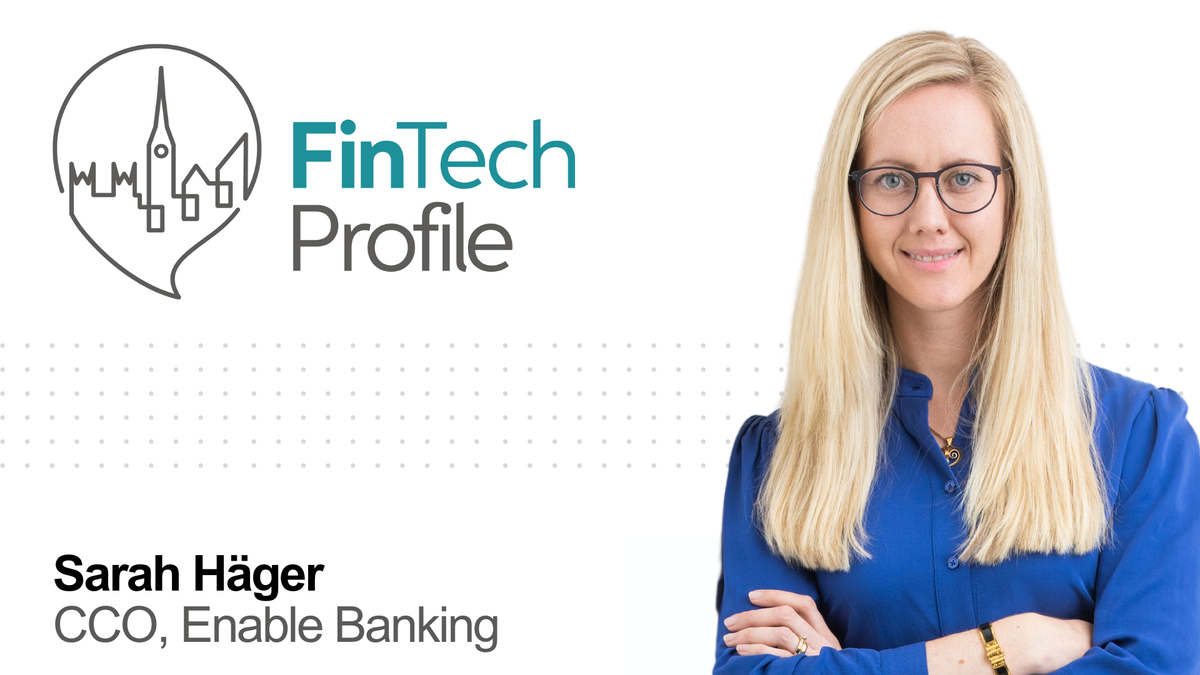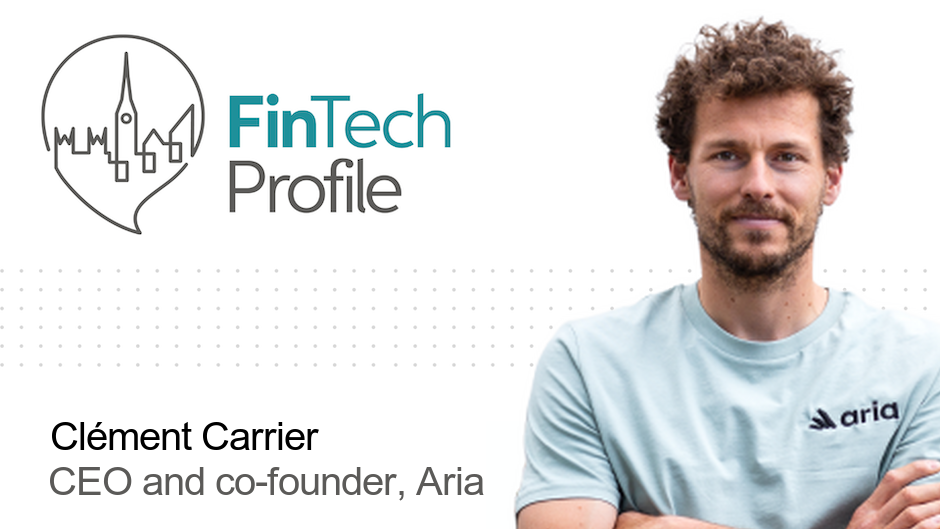Sarah Häger, CCO, Enable Banking

Today I’m delighted to bring you an interview with Sarah Häger, CCO at Enable Banking and well-known European Open Banking expert.
Over to you Sarah:
Who are you and what’s your background?
I studied at Handelshögskolan i Göteborg (Gothenburg School of Business, Economics and Law) and the University of Mannheim, where I built a solid foundation in finance and business. These experiences ignited my passion for innovation and set me on a path to transform the banking world.
My journey began at Nordea Bank, where I worked for 15 years in both Sweden and Germany. During my time at Nordea, I led the Open Banking Community team for six years, where we built and positioned the bank at the forefront of Open Banking initiatives and API technology beyond PSD2.
Driven by a desire to break away from the constraints of traditional banking, I joined Enable Banking. I sought a more agile environment where I could leverage my expertise and directly impact the financial ecosystem. I love the challenge of exploring new possibilities and use cases for open banking with companies and verticals that have yet to realise the potential!
Beyond my professional roles, I am a regular speaker at industry events in many countries. I actively participate in events like Stockholm Fintech Week and Nordic Fintech Week. I’m also an angel investor in early stage companies.
What is your job title and what are your general responsibilities?
I’m the Chief Commercial Officer (CCO) at Enable Banking. My responsibilities include:
- Overseeing the company’s commercial strategy and business development efforts as well as contributing to the overall company strategy.
- Leading sales, marketing, and customer success to drive revenue growth and market expansion.
- Developing and maintaining key client relationships, particularly with companies new to open banking.
- Identifying new business opportunities and use cases for the open banking technology.
- Representing Enable Banking at industry events and conferences as a thought leader in open banking and fintech.
- Managing partnerships and strategic alliances to expand Enable Banking’s reach and capabilities.
- Collaborating with the product and technology teams to ensure Enable Banking’s solutions meet market needs and stay ahead of industry trends.
- Pitching for new potential investors and collaborating with existing investors.
Can you give us an overview of your business?
Enable Banking is a leading open banking connectivity provider, offering a secure, single API solution that seamlessly integrates with over 2,500 banks across Europe.
Our mission is to empower businesses to build the next generation of financial services using open banking capabilities.
Key features and unique selling points:
- Universal API: Our single, universal API connects to over 2,600 major banks in 29 countries, simplifying integration and eliminating the need for multiple agreements.
- Data security: We prioritise customer data protection by never touching, handling or storing sensitive information. All data remains under the control of our partners and their customers. We are the FedEx of your data.
- Future-proof solution: Our API is PSD3-ready, ensuring that businesses can quickly adapt to the evolving open banking landscape.
- Non-intrusive approach: Unlike competitors, we don’t develop competing products or use intrusive data modelling tactics. Our focus is on empowering our customers’ business models.
Tell us how you are funded?
We are funded by a variety of investors including:
- 70 Ventures
- Forward VC
- Wellstreet
Complementary to this a few employees and angels have had the opportunity to invest in the company.
What’s the origin story? Why did you start the company? To solve what problems?
Enable Banking was founded to address several key challenges in the financial technology landscape:
- Complexity of bank integrations: The founders, coming from the ERP scene, recognised that businesses were struggling to integrate with multiple banks across Europe, each with their own unique APIs and protocols. This complexity hindered innovation and slowed down the process in comparison to what banking solutions could offer.
- Data security and control: Concerns about how financial data was being handled and stored by third-party providers prompted Enable Banking to create a more secure and transparent approach to open banking.
- Need for a non-intrusive solution: Many existing open banking providers developed competing products or used intrusive data modelling tactics. The founders aimed to create a solution that empowered businesses without compromising their control over customer data or business models.
- Fragmented European market: Different regulations and banking systems across European countries create a need for a unified solution that could work seamlessly across borders.
Who are your target customers? What’s your revenue model?
We assist lenders and lending technology companies in improving their risk and scoring models, working with clients such as Froda, Capital Box, Kreditz, Monthio, Gokind, Xpektor, CRIF, and others. Additionally, we support ERPs in automating their processes, collaborating with companies like Bokio, Zervant, Procountor, and more and we work with loyalty such as SAS Eurobonus, Novatag, Propspoints.
If you had a magic wand, what one thing would you change in the banking and/or FinTech sector?
If I had a magic wand, I would:
- Create the impact that more banks stop the defensive approach towards Open Banking and take the proactive approach like tex Nordea.
- End banks defensive approach to Open Banking in favour of a more proactive and strategic approach towards open banking. Open Banking is so much more than just a compliance initiative.
- Ensure transparency among licensed TPPs/fintechs and banks in how they handle and share end-user data.
What is your message for the larger players in the Financial Services marketplace?
To the CEOs and CIOs of the largest banks:
- Watch my presentation “If I had a Bank, What Would I do with Open Banking”, to understand the commercial advantages of open banking technology beyond mere compliance.
- Don’t fall into the pitfall of viewing Open Banking solely as a compliance initiative banks should comply with.
- Leverage the platform that your team has built to comply with PSD2 and PSD3 for both internal and external commercial initiatives using premium and partner APIs.
Where do you get your Financial Services/FinTech industry news from?
Can you list 3 people you rate from the FinTech and/or Financial Services sector that we should be following on LinkedIn, and why?
- Sanela Dulic – Head of Open Banking, Nordea – to keep track of what one of the most progressive banks is doing in Open Banking
- Marie Walker – to keep track of what is ongoing in Europe and globally on Open Banking
- Nicola Breyer – to Keep track of what is happening in DACH
What FinTech services (and/or apps) do you personally use?
Impossible to name them all as I love to try new apps and services, but a few I’ve been using long term are:
- Bolageriet, for bookkeeping of my company
- Tilisy.com for testing what data I can get from which banks
- Pliant for Credit Cards services
- Roaring to get relevant information
- Tjing to teach my small kids saving and investing.
What’s the best new FinTech product or service you’ve seen recently?
Some standout companies leveraging open banking that I really love include:
- SAS Eurobonus: Using open banking to illustrate the potential bonus points/flights when choosing a SAS credit card.
- Xpektor and Gokind: Combining open banking with location data and bookkeeping data to highlight financial risks.
- Bolageriet and Bokio: Using Open Banking to automate bookkeeping and payments.
Finally, let’s talk about predictions. What trends do you think are going to define the next few years in the FinTech sector?
- Open Banking Adoption: Open Banking will see increased acceptance among consumers as they recognize its benefits, such as personalised financial solutions and better financial management. Companies will leverage Open Banking data to enhance their services and improve customer experiences. More non-financial verticals will realise and take advantage of Open Banking.
- Evolving Regulatory Landscape: The naming (already!) of future regulations like FIDA2, PSD4, and PSR2 will further advance the regulatory environment. This will boost investment in regulatory technology (RegTech) to help financial institutions comply efficiently while ensuring data security and consumer privacy.
- Rise of AI and Machine Learning: Artificial Intelligence and Machine Learning will continue to revolutionise fintech by automating processes and providing personalised financial insights. These technologies will enhance fraud detection and risk management, enabling hyper-personalised services that cater to diverse consumer and corporate needs.
- Embedded Finance Growth: Embedded finance will expand as financial services become integrated into non-financial platforms, allowing businesses to offer financial products directly within their apps and websites. This trend enhances customer convenience and engagement.
- Focus on Consumer Needs: Ultimately, the success of these trends hinges on understanding and meeting consumer needs. Fintech companies and banks that prioritise digital user-friendly, innovative solutions will remain competitive and relevant in this rapidly evolving landscape.
Thank you very much for participating Sarah — and I’ll hopefully see you in Copenhagen next month at Nordic Fintech Week!
You can visit Sarah at her LinkedIn profile (Sarah Häger) and find more about Enable Banking at https://enablebanking.com/.




